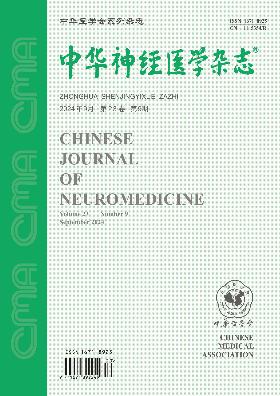Mechanism of resveratrol in alleviating neuroinflammation after cerebral ischemia reperfusion by inhibiting Toll like receptor 4 signaling pathway
Q4 Medicine
引用次数: 0
Abstract
Objective To explore the mechanism of resveratrol in alleviating neuroinflammation after cerebral ischemia-reperfusion injury by inhibiting Toll like receptor 4 (TLR4) signaling pathway. Methods Sixty adult male SD rats were randomly divided into sham-operated group, cerebral ischemia-reperfusion injury group, and resveratrol treatment group (n=20). Rat models of transient middle cerebral artery occlusion (MCAO) in the latter two groups were prepared by modified thread embolization method; reperfusion was performed after 2 h of occlusion, and 20 mg/kg normal saline or resveratrol via tail vein injection was given 15 min before model preparation and one min before reperfusion, respectively. At 72 h after MACO, neurological severity scale (NSS) was applied to evaluate the neurological functions of rats. Enzyme linked immunosorbent assay was performed to detect the expressions of pro-inflammatory cytokines interleukin (IL)-1β, IL-6, tumor necrosis factor (TNF)-α and anti-inflammatory cytokines IL-4, IL-10, and transforming growth factor (TGF)-β. Reverse transcription-polymerase chain reaction was performed to detect the mRNA expressions of M1 signature markers IL-1β and CD32 and M2 signature markers CD206 and Arginase-1. Western blotting was used to detect the expressions of TLR4 signaling molecules TLR4, myeloid differentiation protein 88 (MyD88), tumor necrosis factor receptor-associated factor 6 (TRAF6), IL-1 receptor associated kinase 1 (IRAK1) and nuclear factor (NF)-κB. Results As compared with those in the sham-operated group, rats in the cerebral ischemia-reperfusion injury group had significantly decreased NSS scores, significantly elevated levels of IL-1β, IL-6, TNF-α, IL-4, IL-10, and TGF-β in the damaged brain tissues, significantly elevated mRNA expression levels of IL-1β, CD32, CD206, and Arginase-1, and significantly elevated protein expression levels of TLR4, MyD88, TRAF6, IRAK1 and NF-κB (P<0.05). As compared with rats in the cerebral ischemia-reperfusion injury group, rats in the resveratrol treatment group had significantly decreased NSS scores, significantly decreased levels of IL-1β, IL-6, and TNF-α, significantly elevated levels of IL-4, IL-10, and TGF-β in the damaged brain tissues, significantly deceased mRNA expression levels of IL-1β and CD32, significantly elevated mRNA expression levels of CD206 and Arginase-1, and significantly decreased protein expression levels of TLR4, MyD88, TRAF6, IRAK1 and NF-κB (P<0.05). Conclusion Resveratrol inhibits microglia M1-type polarization and promotes M2-type polarization after cerebral ischemia reperfusion by inhibiting TLR4 signaling pathway, which further reduces neuroinflammation and neurological deficits. Key words: Resveratrol; Cerebral ischemia reperfusion; Toll like receptor 4; Microglia; Neuroinflammation白藜芦醇通过抑制Toll样受体4信号通路减轻脑缺血再灌注后神经炎症的机制
目的探讨白藜芦醇通过抑制Toll样受体4 (TLR4)信号通路减轻脑缺血再灌注损伤后神经炎症的机制。方法将60只成年雄性SD大鼠随机分为假手术组、脑缺血再灌注损伤组和白藜芦醇治疗组各20只。后两组采用改良线栓法制备短暂性大脑中动脉闭塞大鼠模型;闭塞2 h后再灌注,造模前15 min、再灌注前1 min分别尾静脉注射生理盐水或白藜芦醇20 mg/kg。术后72 h,应用神经功能严重程度量表(NSS)评价大鼠神经功能。采用酶联免疫吸附法检测促炎细胞因子白介素(IL)-1β、IL-6、肿瘤坏死因子(TNF)-α和抗炎细胞因子IL-4、IL-10、转化生长因子(TGF)-β的表达。采用逆转录聚合酶链反应检测M1标记物IL-1β、CD32和M2标记物CD206、Arginase-1的mRNA表达。Western blotting检测TLR4信号分子TLR4、髓样分化蛋白88 (MyD88)、肿瘤坏死因子受体相关因子6 (TRAF6)、IL-1受体相关激酶1 (IRAK1)、核因子-κB的表达。结果与假手术组比较,脑缺血再灌注损伤组大鼠NSS评分显著降低,损伤脑组织中IL-1β、IL-6、TNF-α、IL-4、IL-10、TGF-β水平显著升高,IL-1β、CD32、CD206、Arginase-1 mRNA表达水平显著升高,TLR4、MyD88、TRAF6、IRAK1、NF-κB蛋白表达水平显著升高(P<0.05)。与脑缺血再灌注损伤组相比,白藜芦醇治疗组大鼠NSS评分显著降低,损伤脑组织中IL-1β、IL-6、TNF-α水平显著降低,IL-4、IL-10、TGF-β水平显著升高,IL-1β、CD32 mRNA表达水平显著降低,CD206、Arginase-1 mRNA表达水平显著升高,TLR4蛋白表达水平显著降低;MyD88、TRAF6、IRAK1、NF-κB差异均有统计学意义(P<0.05)。结论白藜芦醇通过抑制TLR4信号通路抑制脑缺血再灌注后小胶质细胞m1型极化,促进m2型极化,进一步减轻神经炎症和神经功能缺损。关键词:白藜芦醇;脑缺血再灌注;Toll样受体4;小胶质细胞;神经炎症
本文章由计算机程序翻译,如有差异,请以英文原文为准。
求助全文
约1分钟内获得全文
求助全文
来源期刊

中华神经医学杂志
Psychology-Neuropsychology and Physiological Psychology
CiteScore
0.30
自引率
0.00%
发文量
6272
期刊介绍:
 求助内容:
求助内容: 应助结果提醒方式:
应助结果提醒方式:


